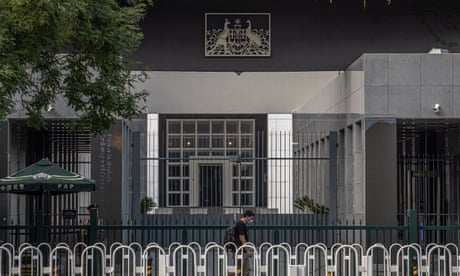- by foxnews
- 10 Mar 2025
Australia’s diplomatic network has ‘serious gaps’ and needs boost, review warns
Australia’s diplomatic network has ‘serious gaps’ and needs boost, review warns
- by theguardian
- 09 May 2023
- in news

Some parts of Australia's overseas diplomatic network are "stretched to the point of ineffectiveness" and need a staffing boost, a review has warned the government.
The review, overseen in part by the influential foreign policy expert Allan Gyngell who died last week, has identified "serious gaps" in Australia's foreign service.
It calls for reforms over the next 10 years to ensure the Department of Foreign Affairs and Trade can "make Australia's case and seek to avert shocks or conflict".
This should include boosting numbers at some diplomatic posts where currently only one person is stationed.
Over time, it says, the government should raise to three the minimum number of people representing Australia at most posts "to ensure a staffing profile with the capacity to achieve outcomes".
The review also urges the government to increase the budget for public diplomacy, so that more of Australia's embassies can produce video content to spread their key messages.
It calls for a cyber attack response team to be created to help Pacific countries respond to potentially debilitating cyber activity.
The prime minister, Anthony Albanese, has signalled that Tuesday night's budget will include funding to increase Australia's engagement with Asia and the Pacific, although the exact amounts and details have yet to be spelled out.
The Dfat capability review was conducted by an internal taskforce, but relied on advice from Gyngell, the former Australia Post boss Christine Holgate and former Australian federal police commissioner Andrew Colvin.
Gyngell, who was a senior adviser to former prime minister Paul Keating, wrote that the international environment over the next 10 years would be "different from anything Australia has known since its foreign service was established".
Gyngell cited the fragmentation of the post-war international system, increasing pressure on multilateral institutions, growing competition between China and the United States, rising risks of nuclear conflict, and dangerous climate change.
"For years, judged against both international comparisons and comparisons with Australia's national security agencies, the instruments of Australian foreign policy have been underfunded and, at times, marginalised," Gyngell wrote in the foreword.
"Serious gaps, outlined in this report, now exist in the capabilities of Australian foreign policy, including in Australia's strategic communications capacity and the government's secure communications system."
In terms of diplomatic presence, Australia ranked 19th among G20 nations, and 20th out of 38 in the OECD, the report said.
The network of overseas staff was "stretched to the point of ineffectiveness in some of the areas that matter to Australia", Gyngell wrote. The report was not specific about geographic areas, but pointed to emerging specialities as needing particular attention.
"Dfat needs major improvements to skills training, including diplomatic tradecraft, as its workforce becomes more diverse and incorporates, or engages with, greater numbers of specialists in emerging areas such as cyber, artificial intelligence, space and the environment," Gyngell wrote.
Most of the recommendations look at actions the department can take within existing resources - but the government is understood to believe the times also demand additional funding for diplomacy.
The report said programs should be reviewed for "efficiency and consistency with government priorities, for example, from projecting diverse, modern Australia to building greater Indo-Pacific literacy, to addressing climate change and advancing gender equality".
IT upgrades are also on the agenda. The report said Dfat should make its reporting and analysis from diplomatic posts "more accessible through a formal messaging system that attracts greater use by other government agencies, improves the ability to share messages with partner governments, is reliable and provides a more intuitive user interface".
The secretary of the department, Jan Adams, vowed to "build the high-performing and influential foreign service that Australia needs for the future".
The foreign affairs minister, Penny Wong, used a National Press Club speech last month to call for "unprecedented coordination and ambition in our statecraft".
- by foxnews
- descember 09, 2016
Ancient structure used for cult 'rituals' discovered by archaeologists
A Neolithic Timber Circle was discovered by archeologists in Denmark resembling the historical landmark Stonehenge in the U.K. It is open to be viewed by the public.
read more


